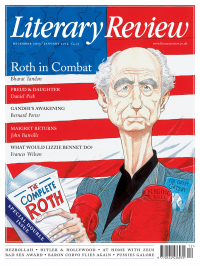John Keay
Baywatch
Crossing the Bay of Bengal: The Furies of Nature and the Fortunes of Migrants
By Sunil S Amrith
Harvard University Press 353pp £22.95
I once fetched up in the south Sumatran town of Bengkulu on what proved to be the tenth day of Muharram. Thanks to several punctures and a stray bullet, the overnight bus from Bukittingi had taken longer than it should have. It was noon before it reached its destination and I was hungrily grappling with a soft-boiled egg without the benefit of egg cup or spoon when the uproar began. ‘Tabot, Tabot,’ urged the waitress. ‘You must hurry,’ beamed the receptionist. The street, deserted a few minutes before, now heaved with festive jollity. Expectant thousands lined the narrow tarmac as the sound of gongs and drums grew louder. From the crowd extravagantly capering dancers emerged, while in the distance there swayed into sight a cavalcade of towered and tinsel-bedecked architecture. There were forts and palaces, ships, mosques and temples. One had two dozen storeys and a large bird of prey that flapped its wings and kept getting entangled with the telephone wires. Sometimes known as tazia, the floats (of which there were over sixty) were drawn by gangs of bandanna-wearing lascars with long knives in their waistbands. Among them cavorted a miscellany of horses, maharajahs, elephants and monkeys, along with a whale, Walt Disney’s Pluto and a mermaid in a naval officer’s cap and sunglasses who gave a rather fetching salute. This was Tabot, south Sumatra’s one real carnival.
‘Tabot, it

Sign Up to our newsletter
Receive free articles, highlights from the archive, news, details of prizes, and much more.@Lit_Review
Follow Literary Review on Twitter
Twitter Feed
It wasn’t until 1825 that Pepys’s diary became available for the first time. How it was eventually decrypted and published is a story of subterfuge and duplicity.
Kate Loveman tells the tale.
Kate Loveman - Publishing Pepys
Kate Loveman: Publishing Pepys
literaryreview.co.uk
Arthur Christopher Benson was a pillar of the Edwardian establishment. He was supremely well connected. As his newly published diaries reveal, he was also riotously indiscreet.
Piers Brendon compares Benson’s journals to others from the 20th century.
Piers Brendon - Land of Dopes & Tories
Piers Brendon: Land of Dopes & Tories - The Benson Diaries: Selections from the Diary of Arthur Christopher Benson by Eamon Duffy & Ronald Hyam (edd)
literaryreview.co.uk
Of the siblings Gwen and Augustus John, it is Augustus who has commanded most attention from collectors and connoisseurs.
Was he really the finer artist, asks Tanya Harrod, or is it time Gwen emerged from her brother’s shadow?
Tanya Harrod - Cut from the Same Canvas
Tanya Harrod: Cut from the Same Canvas - Artists, Siblings, Visionaries: The Lives and Loves of Gwen and Augustus John by Judith Mackrell
literaryreview.co.uk